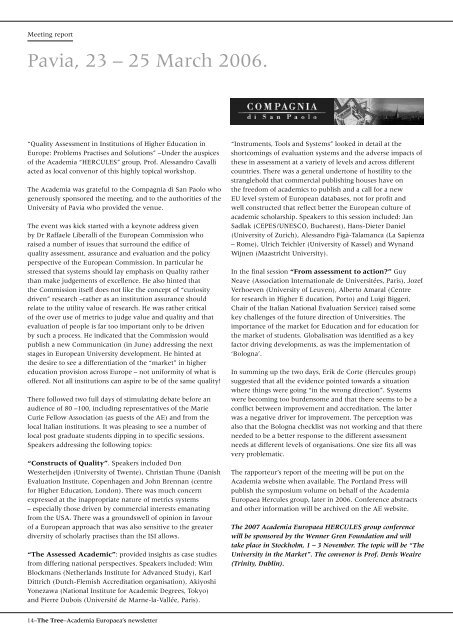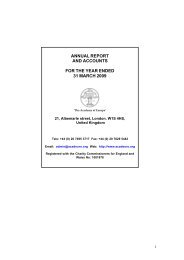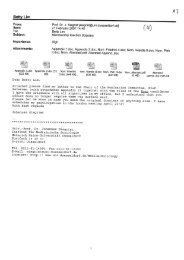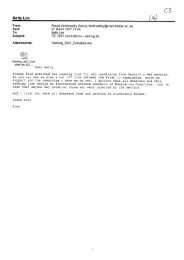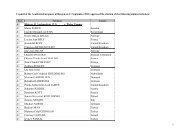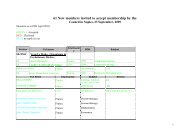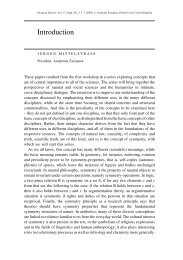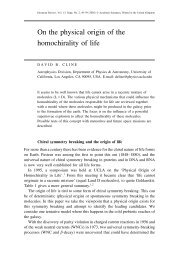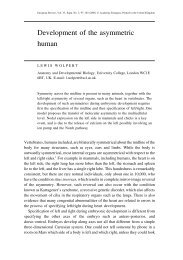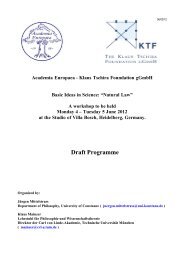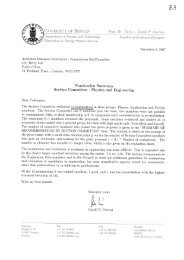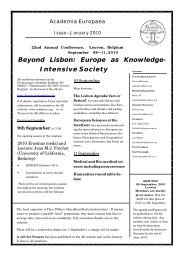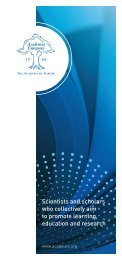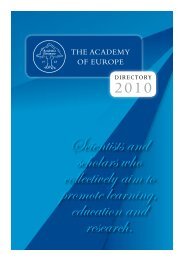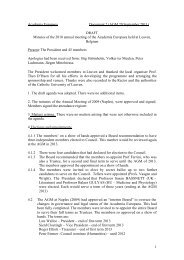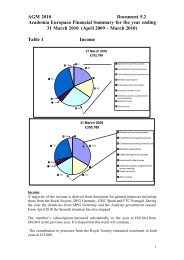Create successful ePaper yourself
Turn your PDF publications into a flip-book with our unique Google optimized e-Paper software.
Meeting report<br />
Pavia, 23 – 25 March 2006.<br />
“Quality Assessment in Institutions of Higher Education in<br />
Europe: Problems Practises and Solutions” –Under the auspices<br />
of the <strong>Academia</strong> “HERCULES” group, Prof. Alessandro Cavalli<br />
acted as local convenor of this highly topical workshop.<br />
<strong>The</strong> <strong>Academia</strong> was grateful to the Compagnia di San Paolo who<br />
generously sponsored the meeting, and to the authorities of the<br />
University of Pavia who provided the venue.<br />
<strong>The</strong> event was kick started with a keynote address given<br />
by Dr Raffaele Liberalli of the European Commission who<br />
raised a number of issues that surround the edifice of<br />
quality assessment, assurance and evaluation and the policy<br />
perspective of the European Commission. In particular he<br />
stressed that systems should lay emphasis on Quality rather<br />
than make judgements of excellence. He also hinted that<br />
the Commission itself does not like the concept of “curiosity<br />
driven” research –rather as an institution assurance should<br />
relate to the utility value of research. He was rather critical<br />
of the over use of metrics to judge value and quality and that<br />
evaluation of people is far too important only to be driven<br />
by such a process. He indicated that the Commission would<br />
publish a new Communication (in June) addressing the next<br />
stages in European University development. He hinted at<br />
the desire to see a differentiation of the “market” in higher<br />
education provision across Europe – not uniformity of what is<br />
offered. Not all institutions can aspire to be of the same quality!<br />
<strong>The</strong>re followed two full days of stimulating debate before an<br />
audience of 80 –100, including representatives of the Marie<br />
Curie Fellow Association (as guests of the AE) and from the<br />
local Italian institutions. It was pleasing to see a number of<br />
local post graduate students dipping in to specific sessions.<br />
Speakers addressing the following topics:<br />
“Constructs of Quality”. Speakers included Don<br />
Westerheijden (University of Twente), Christian Thune (Danish<br />
Evaluation Institute, Copenhagen and John Brennan (centre<br />
for Higher Education, London). <strong>The</strong>re was much concern<br />
expressed at the inappropriate nature of metrics systems<br />
– especially those driven by commercial interests emanating<br />
from the USA. <strong>The</strong>re was a groundswell of opinion in favour<br />
of a European approach that was also sensitive to the greater<br />
diversity of scholarly practises than the ISI allows.<br />
“<strong>The</strong> Assessed Academic”: provided insights as case studies<br />
from differing national perspectives. Speakers included: Wim<br />
Blockmans (Netherlands Institute for Advanced Study), Karl<br />
Dittrich (Dutch-Flemish Accreditation organisation), Akiyoshi<br />
Yonezawa (National Institute for Academic Degrees, Tokyo)<br />
and Pierre Dubois (Université de Marne-la-Vallée, Paris).<br />
“Instruments, Tools and Systems” looked in detail at the<br />
shortcomings of evaluation systems and the adverse impacts of<br />
these in assessment at a variety of levels and across different<br />
countries. <strong>The</strong>re was a general undertone of hostility to the<br />
stranglehold that commercial publishing houses have on<br />
the freedom of academics to publish and a call for a new<br />
EU level system of European databases, not for profit and<br />
well constructed that reflect better the European culture of<br />
academic scholarship. Speakers to this session included: Jan<br />
Sadlak (CEPES/UNESCO, Bucharest), Hans-Dieter Daniel<br />
(University of Zurich), Alessandro Figà-Talamanca (La Sapienza<br />
– Rome), Ulrich Teichler (University of Kassel) and Wynand<br />
Wijnen (Maastricht University).<br />
In the final session “From assessment to action” Guy<br />
Neave (Association Internationale de Universitées, Paris), Jozef<br />
Verhoeven (University of Leuven), Alberto Amaral (Centre<br />
for research in Higher E ducation, Porto) and Luigi Biggeri,<br />
Chair of the Italian National Evaluation Service) raised some<br />
key challenges of the future direction of Universities. <strong>The</strong><br />
importance of the market for Education and for education for<br />
the market of students. Globalisation was identified as a key<br />
factor driving developments, as was the implementation of<br />
‘Bologna’.<br />
In summing up the two days, Erik de Corte (Hercules group)<br />
suggested that all the evidence pointed towards a situation<br />
where things were going “in the wrong direction”. Systems<br />
were becoming too burdensome and that there seems to be a<br />
conflict between improvement and accreditation. <strong>The</strong> latter<br />
was a negative driver for improvement. <strong>The</strong> perception was<br />
also that the Bologna checklist was not working and that there<br />
needed to be a better response to the different assessment<br />
needs at different levels of organisations. One size fits all was<br />
very problematic.<br />
<strong>The</strong> rapporteur’s report of the meeting will be put on the<br />
<strong>Academia</strong> website when available. <strong>The</strong> Portland Press will<br />
publish the symposium volume on behalf of the <strong>Academia</strong><br />
<strong>Europaea</strong> Hercules group, later in 2006. Conference abstracts<br />
and other information will be archived on the AE website.<br />
<strong>The</strong> 2007 <strong>Academia</strong> <strong>Europaea</strong> HERCULES group conference<br />
will be sponsored by the Wenner Gren Foundation and will<br />
take place in Stockholm, 1 – 3 November. <strong>The</strong> topic will be “<strong>The</strong><br />
University in the Market”. <strong>The</strong> convenor is Prof. Denis Weaire<br />
(Trinity, Dublin).<br />
14–<strong>The</strong> <strong>Tree</strong>–<strong>Academia</strong> <strong>Europaea</strong>’s newsletter


